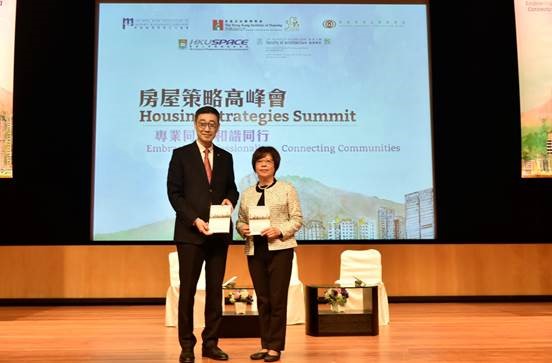(28 November 2018, Hong Kong) A pioneering study published by leading academics has exposed the vital role housing managers play in shaping Hong Kong’s vibrant communities. As one of the most densely populated metropolises on earth, 21st Century Hong Kong is home to a unique and challenging urban climate – with more than 70 per cent of its population living in high rise apartment blocks.
Research conducted by the world-renowned Hong Kong University (HKU) has highlighted for the first time the often-overlooked role qualified housing management professionals play in making cramped surroundings more pleasant, social and liveable for the communities that call them home – an ever-mounting responsibility as populations continue to grow and age and housing stock expands. Concurrently the Government of Hong Kong SAR’s Smart City Blueprint has outlined the integral role housing management will play in enabling Hong Kong’s evolution into a more modern, sustainable and liveable megalopolis.
In recognition of the profession’s growing responsibilities and challenges, The Hong Kong Institute of Housing (HKIH) collaborated with leading academics at the Centre of Urban Studies and Urban Planning (CUSUP), of Hong Kong University’s (HKU) Faculty of Architecture, to complete a study into the role and contributions of housing managers in creating liveable residential spaces in the past, present and future.

The Hong Kong Institute of Housing published a report on “Liveability of Large Housing Estates in Hong Kong: Contribution of the Housing Management Profession”.
(Left) HKIH president Calvin Chiang
(Right) Professor Rebecca LH Chiu, Head of HKU’s Department of Urban Planning and Design
Key findings
Published in commemoration of HKIH’s 30th anniversary, “Liveability of Large Housing Estates in Hong Kong: Contribution of the Housing Management Profession”, traces the historic role of the housing management profession, outlines the vital role its practitioners perform today – and makes pertinent recommendations for future progress.
Since being introduced to Hong Kong’s public housing estate in the early 1950s, the housing management profession has grown substantially over the following decades – today more than 70 per cent of the city’s housing stock is managed by HKIH’s base of over 3,100 members.
And it is clear that these professionals are doing a good job – with HKU’s researchers finding that an average of 79 per cent of residents agree that they live in a convenient, comfortable and healthy environment. Their work also found that 60 per cent of residents reported being satisfied with the estate’s social relations with neighbours.
The report gathered the opinions of residents in three public and five private housing estates, in both Hong Kong’s main urban areas and new towns, through both surveys and interviews. Researchers found housing managers perform various multifaceted roles to improve the quality of the physical and the social environments, as well as the more traditional roles of maintaining the quality of dwellings and securing neighbourhood safety.
However despite widespread evidence of the integral role housing managers play in maintaining communities practically and societally, its authors point out housing management professionals are rarely acknowledged as much as their more-established contemporaries in other fields.
“Many urban professionals are involved in the planning, development and operation of high-rise housing estates and thus contribute to the generally satisfactory residential environment – however as a relatively new profession the specific contribution of housing managers to liveability has rarely been asked and acknowledged, let alone appreciated,” writes the report’s leading author, Professor Rebecca LH Chiu, Head of HKU’s Department of Urban Planning and Design.
“We hope that this report could reflect the work, the professionalism, achievement – and room for improvement – of housing managers in their efforts to optimise neighbourhood liveability in an environment which is known to be one of the most compact in the world.”
Recommendations for a brighter future
With a growing need for talented and dedicated management staff, HKU’s study outlined the key skills and characteristics which should be sought for professionals entering this evolving field – which include both a practical knowledge of relevant legal frameworks and tools, maintenance finance and building service issues, as well as social skills such as communication, mediation and community building.
These professional and “soft” skills are necessary to meet the continuous challenges presented by shifting resident demographics, social, economic and political neighbourhood changes, and the advancement of urban science and technology. “Above all the management skills are a people-centred management principle, a caring attitude, professional commitment and continuous intellectual capacity building,” adds Professor Chiu.
HKIH welcomed the report, and pledged to continue upholding the highest standards for professionals in the housing management profession. “HKIH commissioned this study by the Centre of Urban Studies and Urban Planning, of the Hong Kong University’s Faculty of Architecture, in celebration of our landmark 30th anniversary,” said HKIH president Calvin Chiang.
“In many ways the study’s findings were of no great surprise, affirming what our members have known all along but not convincingly articulated – that housing management professionals play an invaluable, often-overlooked role in administering, shepherding and harmonising diverse residential communities across Hong Kong.
“This landmark report recognises past achievements and outlines future challenges for professionals to work towards. By following and learning from these recommendations, housing management professionals will continue their vital work in making Hong Kong a more liveable, sustainable and forward-thinking city for future generations. I’d like to thank Professor Chiu and all of the team at CUSUP for their dedication and insight.”
For more information about HKIH, please visit: http://www.housing.org.hk.












